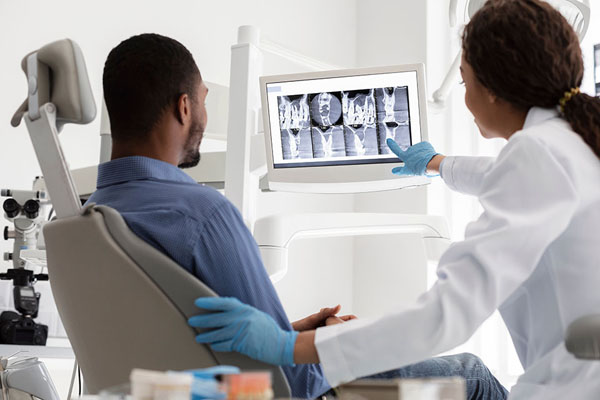TMJ Disorder Causes
How Temporomandibular Joint Disorders Develop
Temporomandibular joint disorders (TMD) are common conditions that affect the jaw joints and muscles. Though the exact causes of TMD are not always clear, several known factors and risk elements can contribute to its development.
If you’re experiencing jaw pain or other TMD symptoms, contact our Jupiter, FL, dental practice today by calling (561) 744-0677 to set up a TMJ consultation.

Common Causes of TMJ Disorders
TMJ disorders often arise from multiple causes. Here are some of the most commonly identified factors:
- Trauma or Injury to the Jaw: Any injury to the jaw, such as a blow or whiplash, can damage the temporomandibular joint (TMJ) and lead to TMD.
- Teeth Grinding (Bruxism): Chronic grinding or clenching of teeth places significant stress on the TMJ, leading to inflammation, pain, and potential long-term damage.
- Arthritis: Conditions such as osteoarthritis and rheumatoid arthritis can damage the cartilage in the TMJ, contributing to the development of TMD.
- Chronic Stress: Elevated stress levels are increasingly recognized as a major factor in TMD development. Stress can cause muscle tension in the jaw and neck, leading to clenching and other harmful habits.
- Dental Problems: Dental conditions such as misaligned teeth, overbites, and underbites can stress the jaw joint and lead to TMJ disorders.
- Joint Degeneration: Over time, the cartilage in the jaw joint can degenerate, leading to TMJ disorders.
- Muscle Dysfunction: Dysfunction or imbalance of the muscles responsible for jaw movement and control can contribute to TMD. This may include overuse or strain of these muscles.
Risk Factors for TMJ Disorders
Common TMD risk factors include:
- Gender: Women are more likely to develop TMJ disorders than men, possibly due to hormonal differences and the increased prevalence of conditions such as fibromyalgia and chronic fatigue syndrome.
- Sleep Disorders: Conditions like sleep apnea and snoring can disrupt sleep patterns and lead to jaw clenching or bruxism during sleep, increasing the risk of TMJ disorders.
- Age: TMJ disorders are most common in individuals between the ages of 20 and 40, although they can develop at any age.
- Genetics: There may be a genetic component to TMJ disorders, as some individuals may inherit a predisposition to this condition.
- Poor Posture: Poor posture can strain the muscles of the neck and jaw, leading to TMJ disorders.
When It’s Time to See the Doctor
If you’re at risk for developing a TMJ disorder and regularly experience symptoms, you should consult with a healthcare professional for an accurate diagnosis and appropriate treatment plan.
Symptoms that may indicate it’s time to see the doctor, include:
- Persistent Jaw Pain: Consistent pain in the jaw, face, or ears may indicate TMJ disorder. Severe or chronic pain that does not respond to self-care measures should prompt a visit to a healthcare provider.
- Jaw Clicking or Popping: Clicking, popping, or grinding noises when opening or closing your mouth could signal joint dysfunction. If these noises are accompanied by pain or limited jaw movement, it is important to consult a professional.
- Difficulty Moving the Jaw: If you experience difficulty or pain when opening or closing your mouth, this could be a sign of TMD.
- Changes in Your Bite: If your bite feels misaligned or your teeth no longer fit together correctly, TMD could be the cause.

Frequently Asked Questions
While TMJ disorders cannot always be prevented, there are steps you can take to reduce your risk. These include practicing good oral hygiene, avoiding hard or chewy foods, managing stress effectively, and maintaining proper posture.
Anyone can develop a TMJ disorder, but women between the ages of 18 to 44 are more likely to experience this condition. Additionally, those with a history of arthritis or other joint problems may be at a higher risk of developing TMJ. Consult your doctor if you believe you have the beginning symptoms of TMD.
It depends. TMJ can either develop gradually or come on suddenly. Some people experience mild symptoms that worsen over time, while others may encounter a sudden onset of severe symptoms.
Early signs of TMJ include tenderness or pain in the jaw, particularly when chewing or speaking. Other early symptoms may include facial pain and clicking or popping sounds when moving the jaw. As TMJ progresses, the pain may become more severe, and other symptoms, such as headaches and ear pain may also develop.
Determine the Root Cause of TMD and Seek Treatment
If you’re experiencing symptoms like jaw pain, limited jaw movement, or clicking sounds, it’s important to seek a professional evaluation. Our Jupiter dental practice is here to help. Dr. Villalobos can provide an accurate diagnosis and recommend a tailored treatment plan to alleviate your symptoms and improve your quality of life.
Call our Jupiter office at (561) 744-0677 to schedule a consultation today. We proudly serve patients in Jupiter and the surrounding areas, including Hobe Sound, Limestone Creek, and Tequesta, FL.
